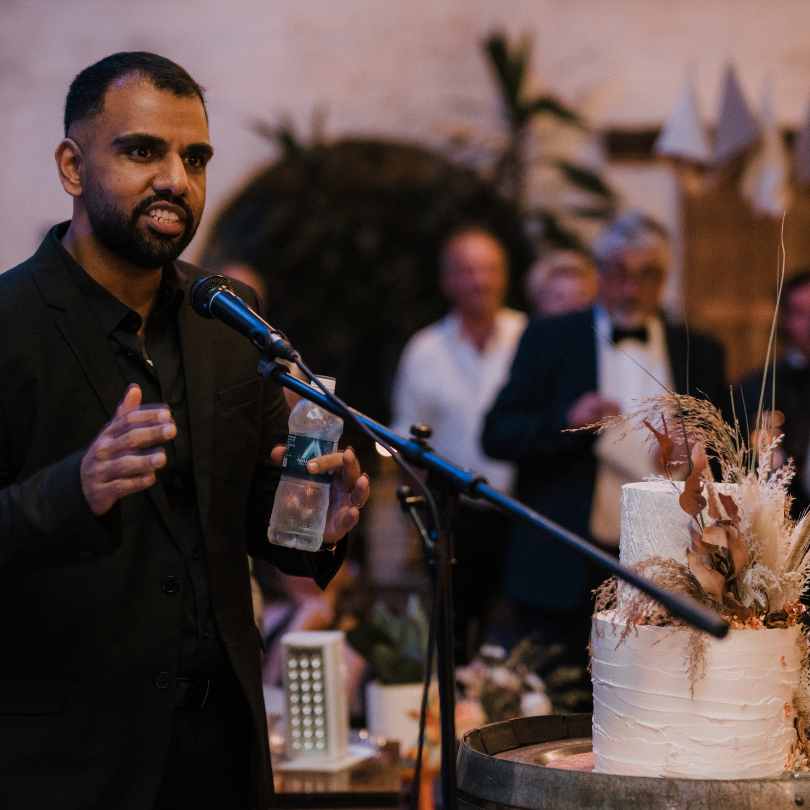
Writing wedding vows is typically one of the most stressful parts of wedding planning for couples. Just writing a letter to a loved one can be intimidating! Capturing how you feel—not to mention articulating these deep feelings without sounding clichéd or corny—can be incredibly tough. Not to mention, there’s the pressure of delivering those words to your loved one with all your friends and family present. The tougher the process, however, the more satisfying the results often are. Here are a few tips to get you going.
A Starting Point
For many of us, any time we sit down to write a letter, we feel a little bit like the orcs from Lord of the Rings when the sun rises—completely frozen. Our advice? Give yourself plenty of time to sculpt these words, to get the tone down, to choose the best joke or anecdote, and to smooth everything over once you’ve got the content down.
Even if you’re anxious or feel strange writing these out a month, or months, before the ceremony, you will thank yourself later. Beginning the process of creating your wedding vows long before you feel pressure can help you write vows that feel most like you. And knowing you have them composed, besides scoring you major points with your significant other, will give you some extra peace of mind as the big day approaches.
“But I work well under pressure. Plus, I want to keep the vows simple.”
We’d argue that the best way to keep your vows concise and true to your personality is creating them without any pressure. Try jotting down a draft of your vows at least a month before the ceremony, so that you can get your thoughts on paper, let them sit awhile until you have fresh eyes again, and follow through with or hone these initial thoughts.
“Flowery, complicated vows aren’t for me. I’ll write a few notes down, but I want to speak from the heart, not read off a notecard.”
If you’re a talented public speaker or part of a local improv guild, then be our guest. Otherwise, we find that the people who tend to ramble during vows are the ones who haven’t written their speeches out or practiced much.
Read Your Vows Aloud

This is a critical part of the process. Practicing your vows aloud won’t make you sound robotic; it’ll make you sound organized. The result will show that you respect your words and thoughts, and your audience, enough to put some work into them.
Reading vows aloud is a great way to see if you’re writing something you’d never say, if a sentence is too long and convoluted, or if you might be insulting someone without intending to. Try reading them to a friend in-person, and get some honest feedback. If this isn’t possible, at least try reading them out loud to yourself. You’ll be surprised how different an experience the words sound when vocalized, compared to reading them silently to yourself.
Study Up
Now that we’ve talked about process, let’s talk about what actually goes inside these declarations of love. Before we go into the meat of the marriage vow, we recommend you read as many vows as possible, so that you can get an idea of what you like and what you don’t. It’s also a great idea to discuss expectations for your vows with your significant other, so that you’re both on the same page. You don’t want to end up writing a novel, only to find your significant other wrote a few lines on a napkin. Set up the expectations before you really start the process.
The Vows Themselves

Feel free to include what you want and leave off what you’re not so into. And don’t be afraid to get creative! Keep in mind that wedding vows are typically one to two minutes long, which doesn’t leave a whole lot of room for embellishments or long stories.
Here Are a Few Major Components of the Vows
Reflections on how your fiance has changed your life, inspired you, or helped you grow
An anecdote on how you met, or any first impressions you had of each other
Hopes for the future such as family additions and how you expect to help each other grow in the coming years
A call to action, or some kind of promise
Here’s What to Avoid
Clichéd, overused, unoriginal language (ask a friend for help if needed)
Anything too personal or embarrassing. Picture the oldest, or most uptight person at your wedding, and think about how you’d feel if you were reading these to him or her
Long stories with unnecessary details. Try to keep anecdotes crisp, humorous, and entertaining
Writing vows anyone could have written
Using language that is dry or too formal (here’s where reading the vows aloud beforehand comes in handy)
Using words you can’t quite pronounce (see above)
Making references a lot of people won’t understand
Embarrassing your partner too much. You might want to leave any bedroom references, political side notes, or exes out of the conversation
In the End…
You’re not just sitting down to write some useless words to mark the task off your to-do list. You’re taking a moment to think about who you are, who your fiance is, and what this relationship means to you. If you can’t come up with anything to say, or aren’t good with words, that’s fine. Just take a moment to check in with yourself on how you’re feeling before such a massive day, and go from there. We promise, you’ll do just fine!
The post How to Write Your Wedding Vows appeared first on Weddingbee.


















